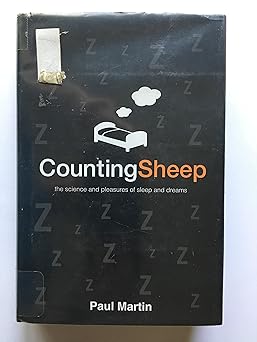Key highlights:
- Discover the best books on sleep science that can help you understand what happens when we sleep.
- Importance of Sleep: Matthew Walker’s “Why We Sleep” underscores the crucial role sleep plays in enhancing cognitive function, regulating emotions, and maintaining overall health.
- Historical and Cultural Perspectives: Kat Duff’s “The Secret Life of Sleep” explores sleep through historical, cultural, and personal lenses, revealing how our understanding of sleep has evolved.
- Scientific Insights: Paul Martin’s “Counting Sheep” provides an engaging look at the science behind sleep, combining research with storytelling to make complex concepts accessible.
- Personal and Scientific Exploration: David K. Randall’s “Dreamland” intertwines his personal experiences with scientific research, offering a comprehensive view of the mysteries and mechanics of sleep.
- Practical Solutions: Arianna Huffington’s “The Sleep Revolution” addresses the global sleep crisis, offering practical advice and scientific strategies to improve sleep quality and overall well-being.
Sleep is a fundamental aspect of our lives, yet its complexities often remain a mystery to many of us. Understanding the science behind sleep can lead to better health, improved mood, and increased productivity.
In this article, I’ve curated five must-read books on sleep science that provide invaluable insights into what happens when we sleep. These books delve into the latest research, explore the impact of sleep on our physical and mental well-being, and offer practical advice for achieving more restorative rest.
If you are struggling with insomnia, curious about your dreams, or simply looking to improve your sleep quality, these books are essential reads that will help you unlock the secrets of restful nights.
Table of Contents
Top Books on Sleep Science to Master Your Sleep
Understanding the science behind sleep is the first step towards improving your sleep quality. Here are five books on sleep science that will give you valuable insights into science of sleep, the importance of sleep, the stages of sleep, andits impact on our health and well-being.

1. Why We Sleep By Matthew Walker
“Why We Sleep” by Matthew Walker, PhD, is a groundbreaking exploration of the vital role sleep plays in our lives. This book presents cutting-edge scientific discoveries about sleep and explains how it impacts every aspect of our physical and mental health. Walker provides a detailed look at why we sleep, what happens when we don’t, and how we can improve our sleep to enhance our overall well-being.
Matthew Walker is a professor of neuroscience and psychology at UC Berkeley and the director of its Sleep and Neuroimaging Lab. He has published over 100 scientific studies on sleep and is a prominent figure in the field of sleep research.
Key Takeaways
- Comprehensive Science: Walker explains the complex biological processes involved in sleep and how it affects brain function and overall health.
- Health Benefits: The book details the myriad benefits of sleep, from improved memory and cognitive function to enhanced emotional regulation and immune system support.
- Consequences of Sleep Deprivation: Walker highlights the serious health risks associated with lack of sleep, including increased susceptibility to chronic diseases like cancer, Alzheimer’s, and diabetes.
- Actionable Advice: He offers practical tips for improving sleep hygiene and achieving more restful and restorative sleep.
- Broad Impact: Walker explores how sleep influences various aspects of life, including learning, mood, energy levels, and even lifespan.
“Why We Sleep” was a revelation to me. Matthew Walker’s thorough and accessible writing opened my eyes to the critical importance of sleep. This book is a must-read for anyone looking to understand and improve their sleep.
2. The Secret Life of Sleep by Kat Duff
“The Secret Life of Sleep” by Kat Duff offers a unique and comprehensive exploration of sleep from various angles. The book blends scientific insights with cultural, historical, and personal perspectives, providing a holistic view of why sleep is so essential to our lives. Duff’s narrative weaves together stories, research, and reflections to illuminate the mysteries and significance of sleep.
Kat Duff is a writer, author, and licensed counselor with a deep interest in the world of sleep. She created the popular blog, The Secret Life of Sleep, which served as the foundation for this book. Duff lives in New Mexico, USA.
Key Takeaways
- Cultural Perspectives: Duff examines how different cultures view and practice sleep, offering insights into various rituals and beliefs around the world.
- Historical Context: The book traces the history of sleep research and how societal changes have influenced our sleep patterns over time.
- Personal Narratives: Through engaging stories and anecdotes, Duff highlights the deeply personal nature of sleep and dreams.
- Scientific Insights: The book incorporates the latest research on sleep, helping readers understand its physiological and psychological functions.
- Practical Advice: Duff provides practical tips and suggestions for improving sleep quality, based on her extensive research and counseling experience.
“The Secret Life of Sleep” was an enlightening read. Kat Duff’s ability to blend scientific information with cultural and personal narratives made for a captivating exploration of sleep. This book is perfect for anyone curious about the many facets of sleep and its impact on our lives.

3. Counting Sheep: The Science and Pleasures of Sleep and Dreams By Paul Martin
“Counting Sheep: The Science and Pleasures of Sleep and Dreams” by Paul Martin is a comprehensive and engaging exploration of the world of sleep. This book delves into the intricate science behind sleep and dreams, while also touching on the cultural and historical aspects of this essential part of our lives. Martin takes readers on a fascinating journey through the mysteries of sleep, examining why it is so crucial to our health and well-being.
Paul Martin is an accomplished author and science writer with a background in behavioral biology. His expertise and ability to translate complex scientific concepts into accessible and engaging prose make this book a compelling read for anyone interested in understanding the importance and intricacies of sleep.
Key Takeaways
- Scientific Exploration: Martin dives deep into the biological and neurological mechanisms of sleep, explaining how and why our bodies and brains need rest.
- Cultural Insights: The book provides a look at how different cultures perceive and practice sleep, offering a broader perspective on this universal activity.
- Historical Context: Martin traces the history of sleep research and how our understanding of sleep has evolved over time.
- Practical Information: The author offers practical advice on how to improve sleep quality, manage sleep disorders, and understand the significance of dreams.
- Engaging Narratives: Through captivating stories and anecdotes, Martin makes the science of sleep accessible and interesting to a broad audience.
Reading “Counting Sheep” was both enlightening and enjoyable. Paul Martin’s blend of scientific rigor and engaging storytelling provided a thorough understanding of sleep that is both informative and entertaining. It’s a must-read for anyone curious about what happens when we close our eyes each night.
4. Dreamland: Adventures in the Strange Science of Sleep By David K. Randall
“Dreamland: Adventures in the Strange Science of Sleep” by David K. Randall delves into the fascinating world of sleep science through the lens of Randall’s personal experience and investigative journalism. Triggered by his own sleepwalking incidents, Randall embarks on a journey to uncover the mysteries of sleep, exploring the latest research and interviewing experts to provide a comprehensive view of what happens during our slumber.
David K. Randall is a senior reporter at Reuters and a New York Times bestselling author. His writing spans various prestigious publications including the New York Times and Wall Street Journal. Randall’s personal experience with sleep disorders lends a unique and compelling perspective to his exploration of sleep science.
Key Takeaways
- Personal Journey: Randall’s own struggle with sleepwalking sets the stage for his deep dive into sleep research, making the narrative both personal and relatable.
- Scientific Exploration: The book covers a wide range of sleep-related topics, from the biological mechanisms of sleep to the psychological and sociological aspects.
- Real-world Applications: Randall examines practical implications of sleep research, such as how sleep affects performance in various professions and daily life.
- Cultural and Historical Perspectives: The book provides insights into how different cultures and historical periods have understood and managed sleep.
- Engaging Narratives: Randall’s storytelling ability makes complex scientific concepts accessible and engaging, enriched with anecdotes and real-life examples.
Reading “Dreamland” was both informative and captivating. David K. Randall’s blend of personal anecdotes, scientific exploration, and engaging storytelling made complex topics easy to understand and thoroughly enjoyable. His ability to connect personal experiences with broader scientific research offers readers a comprehensive view of the importance and intricacies of sleep. This book is a must-read for anyone curious about what happens during the one-third of our lives we spend sleeping.

5. The Sleep Revolution: Transforming Your Life, One Night at a Time by Arianna Huffington
“The Sleep Revolution” by Arianna Huffington is a powerful call to arms for reclaiming our sleep. Huffington argues that we are in the midst of a sleep deprivation crisis with serious implications for our health, productivity, and overall quality of life. This book combines the latest scientific research with practical advice to help readers improve their sleep habits and, by extension, their lives.
Arianna Huffington is the co-founder and former editor-in-chief of The Huffington Post, and the founder of Thrive Global, a company dedicated to health and wellness. She is a prolific author and a prominent advocate for the importance of sleep and well-being.
Key Takeaways
- Health Implications: Huffington details the wide-ranging health impacts of sleep deprivation, from increased risk of chronic diseases to impaired cognitive function.
- Scientific Research: The book incorporates the latest findings from sleep science, explaining the mechanisms of sleep and its vital role in our lives.
- Cultural Critique: Huffington critiques modern society’s dismissal of sleep and the glorification of busyness, advocating for a cultural shift towards valuing rest.
- Practical Advice: She offers a wealth of tips and strategies for improving sleep quality, including recommendations for sleep-friendly environments and routines.
- Personal Insights: Huffington shares her own experiences with sleep deprivation and the transformative power of prioritizing rest.
Reading “The Sleep Revolution” felt like a wake-up call. Arianna Huffington’s compelling arguments and practical advice have convinced me to take sleep seriously. This book is essential for anyone looking to improve their health and well-being through better sleep.

Frequently Asked Questions
How can reading about sleep science improve my sleep?
Reading about sleep science can improve your sleep by providing a deeper understanding of the importance of sleep and the factors that affect sleep quality. This knowledge can help you make informed decisions and implement effective strategies for better rest.
Can understanding sleep cycles and chronotypes help in scheduling my day better?
Yes, understanding sleep cycles and chronotypes can help you schedule your day better. Books like u0022The Power of Whenu0022 by Michael Breus explore the concept of chronotypes and offer tailored recommendations for the best times to engage in various activities based on your body’s internal clock.
Final Thoughts: Embrace the Science of Sleep for a Healthier Life
Exploring the science of sleep through these insightful books has been a transformative journey for me. Each book brings a unique perspective on the complexities and wonders of sleep, helping us understand why it’s so essential to our health and well-being. Matthew Walker’s “Why We Sleep” emphasizes the profound impact sleep has on every aspect of our lives, while Kat Duff’s “The Secret Life of Sleep” offers a more reflective and historical view. Paul Martin’s “Counting Sheep” combines scientific rigor with engaging storytelling, making sleep science accessible and fascinating.
David K. Randall’s “Dreamland” intertwines personal narrative with scientific exploration, shedding light on the mysterious and often overlooked aspects of sleep. Finally, Arianna Huffington’s “The Sleep Revolution” not only highlights the global sleep crisis but also provides practical advice for improving our sleep habits.
By delving into these books, I’ve gained a deeper appreciation for the vital role sleep plays in our lives. Whether you’re looking to enhance your health, boost your productivity, or simply understand the nightly journey we all embark on, these books offer invaluable insights. I highly recommend diving into these reads to unlock the power of a good night’s sleep and transform your life for the better. Happy reading and sweet dreams!












